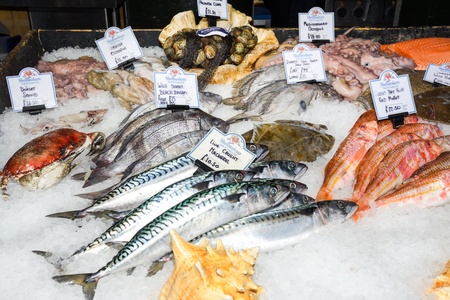A new study has found that for many European countries - including the UK - there is not a large enough fish supply to meet the recommended national dietary requirements.
Scientists from the University of Aberdeen Rowett Institute and School of Biological Sciences carried out the first in-depth investigation into national seafood supplies and how this relates to national dietary recommendations across 31 countries.
The study, which was published in the European Journal of Nutrition recently, analysed seafood supplies based on production, imports and exports, from both wild capture fisheries and aquaculture, and reviewed these against each country’s dietary recommendations.
In the UK, Government Dietary Recommendations, drawn up by Public Health England, recommend two fish per week of which one should be oily. However, there isn’t enough supply of fish to satisfy these dietary guidelines.
Professor Baukje de Roos from the Rowett Institute said: “We found that national dietary recommendations in relation to seafood consumption, as well as seafood availability, varied considerably throughout Europe. In fact, only in 13 out of 31 European countries we investigated, dietary recommendations for fish consumption were satisfied by national seafood supplies. In the UK, we do not retain enough fish to satisfy dietary recommendations. In particular, landlocked countries in Central and Eastern Europe did not have enough seafood supplies to satisfy their dietary recommendations.”
“To ensure healthy and sustainable food environments, it is increasingly important to understand how our diets relate to food supply chains. For example, what is being produced, what is imported and exported, and how does this relate to what we eat and what we should be eating?”
Anneli Lofstedt, a PhD Student at the University of Aberdeen, added: “This knowledge will not only help us to reconsider national food supply chains, but also ensure that current national dietary guidelines not only take into account health benefits to the consumer but also food supplies and the sustainability of food production systems.
“As many foods in a country are part of global production and distribution systems, especially in the case of seafood, it is important that national dietary recommendations start considering national seafood supplies to aid a more sustainable development of marine systems for the supply of seafood.
Professor Paul Fernandes, from the University’s School of Biological Sciences, added: “It is important to note, that from a scientific perspective, there is no doubt that fish can be harvested sustainably. In recent decades, there have been significant improvements in fisheries management in Europe and elsewhere, with numerous examples of recovering fish stocks and sustainable fisheries. However, to maintain this situation and, indeed, expand it to make all fish stocks sustainable, effective integrated management across government policies for fisheries, aquaculture and public health is essential.”


